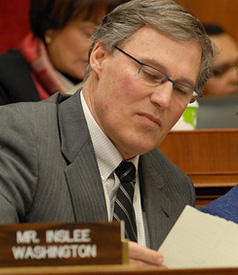If President Obama gets to sign a health reform bill, as I believe he will, one reason may be Rep. Jay Inslee’s difficult experience renovating his kitchen.
He told his kitchen story at a House Democratic caucus held after Republican Scott Brown’s victory in Massachusetts sent Inslee’s colleagues into paroxysms of dismay, chaos and fear. Brown’s triumph reduced the Democrats’ majority in the Senate to “only” 59, and this led many in both houses to want to give up on health reform altogether. Even Obama was sounding an uncertain trumpet.
This made no sense to Inslee, a Democrat from Washington state. First elected to the House in 1992, he was swept out of office in the 1994 Republican landslide that followed the collapse of Bill Clinton’s health care efforts. Four years later, Inslee returned to Congress.
“I introduced myself as a fella who was defeated in 1994, the last time we didn’t pass meaningful health care reform,” Inslee recalls saying. “I said it was a painful event, and I didn’t want them to go through that pain.” In politics, he told his colleagues, assuming the “fetal position” can be the most dangerous thing to do.
And then he recounted all the grief he and his family went through while work on their kitchen renovation dragged on and on and on. “During that time, I had bloodlust against my contractor,” Inslee said. “Six months went by, and he was still arguing with the plumber. Eight months went by, and there were still wires hanging down everywhere, and he was having trouble with the building inspector.”
But eventually, the job got done. “And now I love that kitchen,” Inslee recalls saying. “I bake bread in that kitchen. My wife cooks great meals in that kitchen. The contractor’s now a buddy of mine, and I’ve had beers with him in that kitchen.”
Inslee looked at his colleagues and declared: “We’ve got to finish the kitchen.” His point was that Americans won’t experience any of the benefits of health care reform until Congress actually puts a new system in place.
I called Inslee about his kitchen oration after Rep. David Wu, D-Ore., told me it was one of the turning points in calming Democrats’ nerves. “Now,” Wu says, “people run into him in the hallway, smile and say, ‘Finish the kitchen.'”
There is only one plausible way to finish the kitchen. The House needs to pass the Senate bill and both chambers need to approve amendments to it. At least two amendments are essential to getting the bill through the House. They involve reducing the burden of the tax on so-called Cadillac health care plans, which is wildly unpopular with House members and voters; and getting rid of the special Medicaid subsidy deal for Nebraska, which just about everyone hates. Even Nebraska’s Ben Nelson, the senator for whom that deal was put together, wants it out.
The House and Senate disagree over the order in which these things should be done, but they can resolve this. The real problem is that some Senate Democratic moderates are petrified that Republicans will make terrible trouble if the amendments are passed through the “reconciliation process,” which is fancy congressional talk for majority rule.
Reconciliation bills require a simple majority of the Senate, not the 60 votes that, wrongly, have come to be necessary to get any bill through.
But if Democrats are that intimidated by Republicans, they should just give up their majority. And this fear is politically shortsighted. Right now, every Democrat in the Senate has to defend a vote for the health care bill anyway, with nothing to show for it — and this includes defending the Nebraska deal.
By contrast, voting for amendments to the original Senate bill would be a sign that Democrats heard the message from Massachusetts. Brown won in part because the Nebraska buy-off became a symbol of unseemly legislative logrolling. And many voters would welcome a reduction in a tax on health plans.
Moreover, as Inslee points out, if democracy’s new rule is that nothing gets done without 60 percent of the available votes, Scott Brown, who got 52 percent in Massachusetts, would not be sitting in the Senate.
Democrats can finish the kitchen. Or they can face the wrath of voters who will wonder why the contractors they sent to Washington left all the wires hanging, and the plumbing disconnected and useless.
E.J. Dionne’s e-mail address is ejdionne(at)washpost.com.
(c) 2010, Washington Post Writers Group
Press freedom is under attack
As Trump cracks down on political speech, independent media is increasingly necessary.
Truthout produces reporting you won’t see in the mainstream: journalism from the frontlines of global conflict, interviews with grassroots movement leaders, high-quality legal analysis and more.
Our work is possible thanks to reader support. Help Truthout catalyze change and social justice — make a tax-deductible monthly or one-time donation today.
